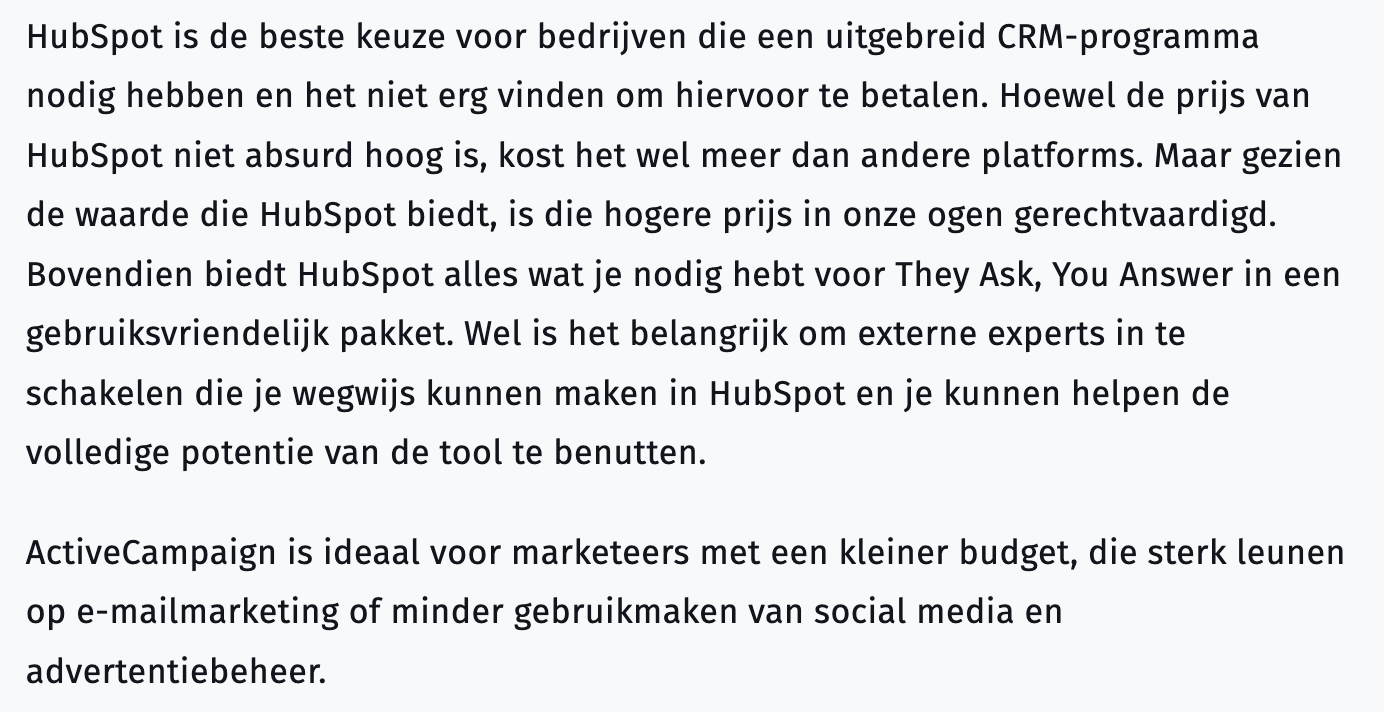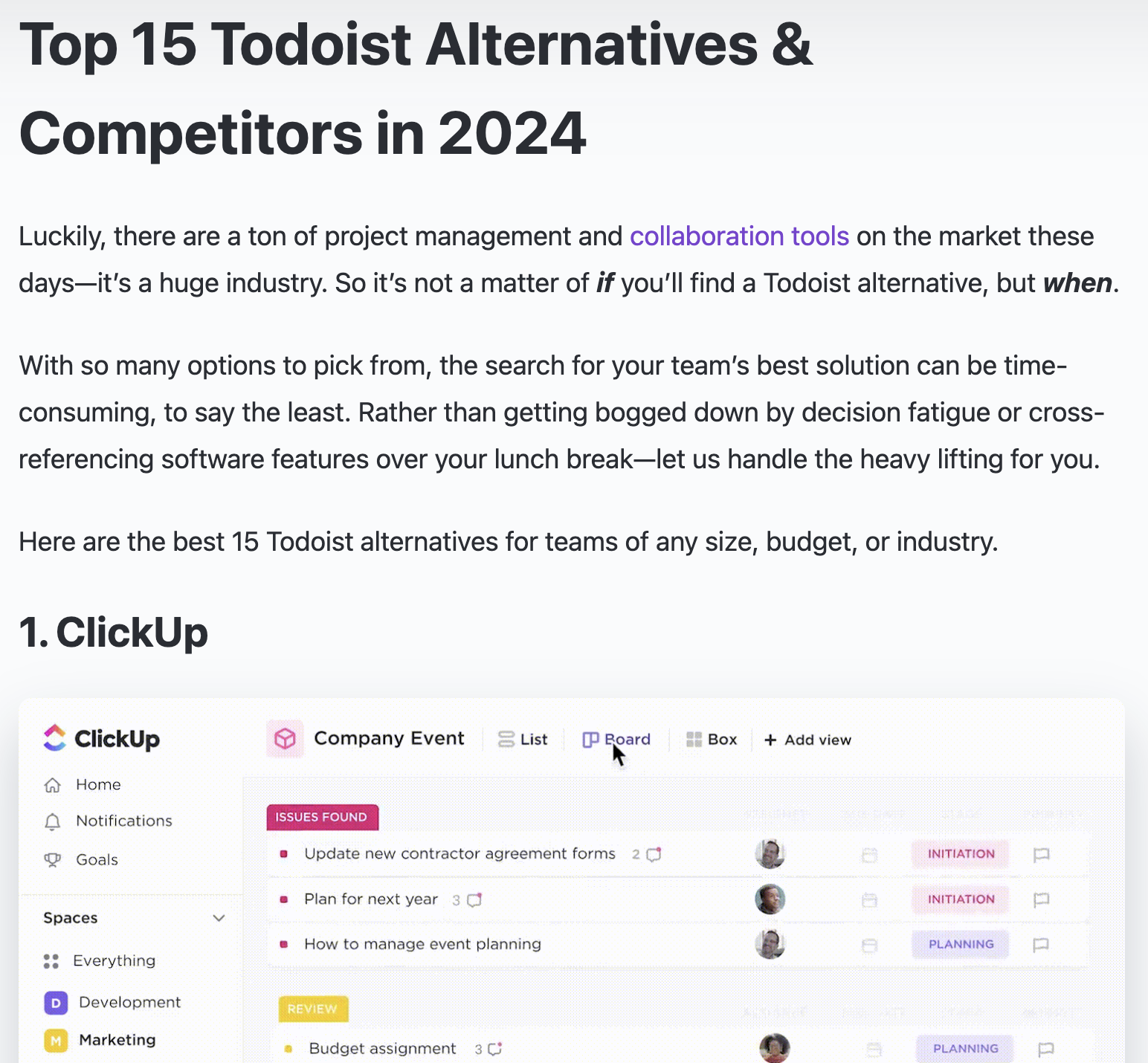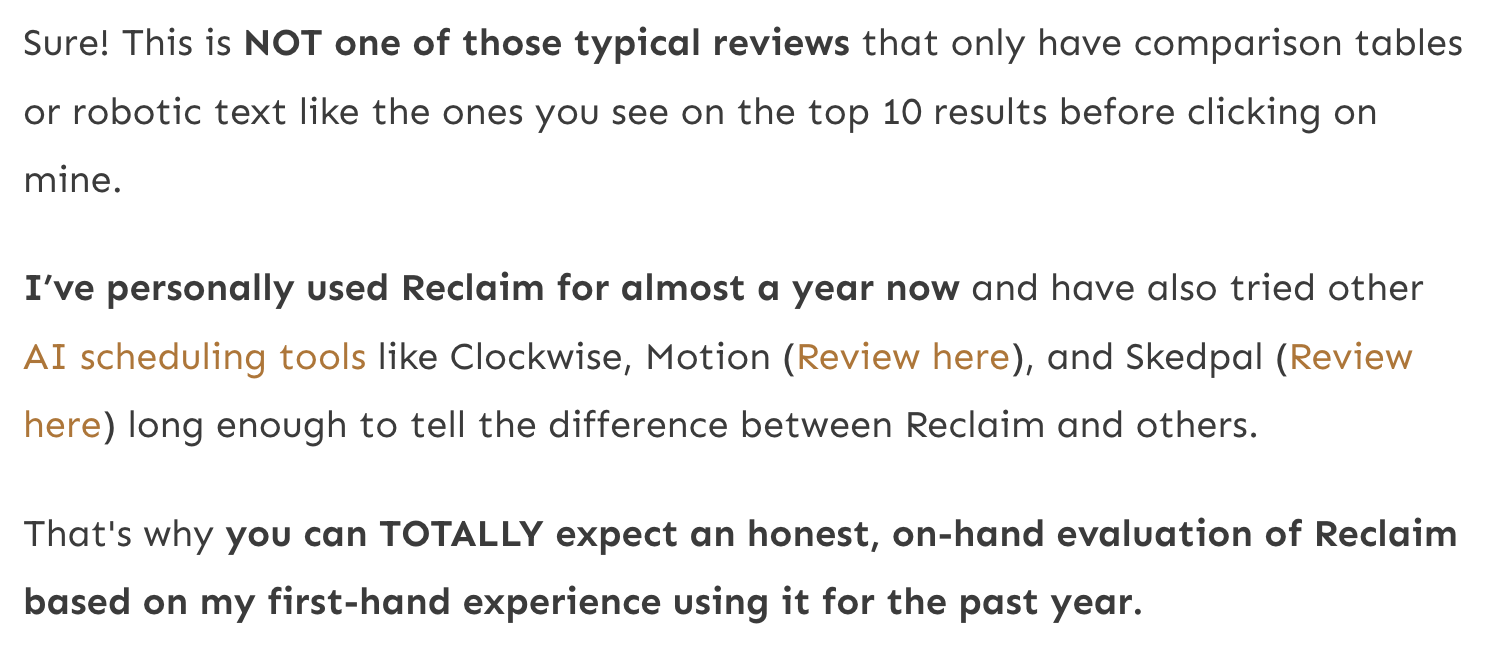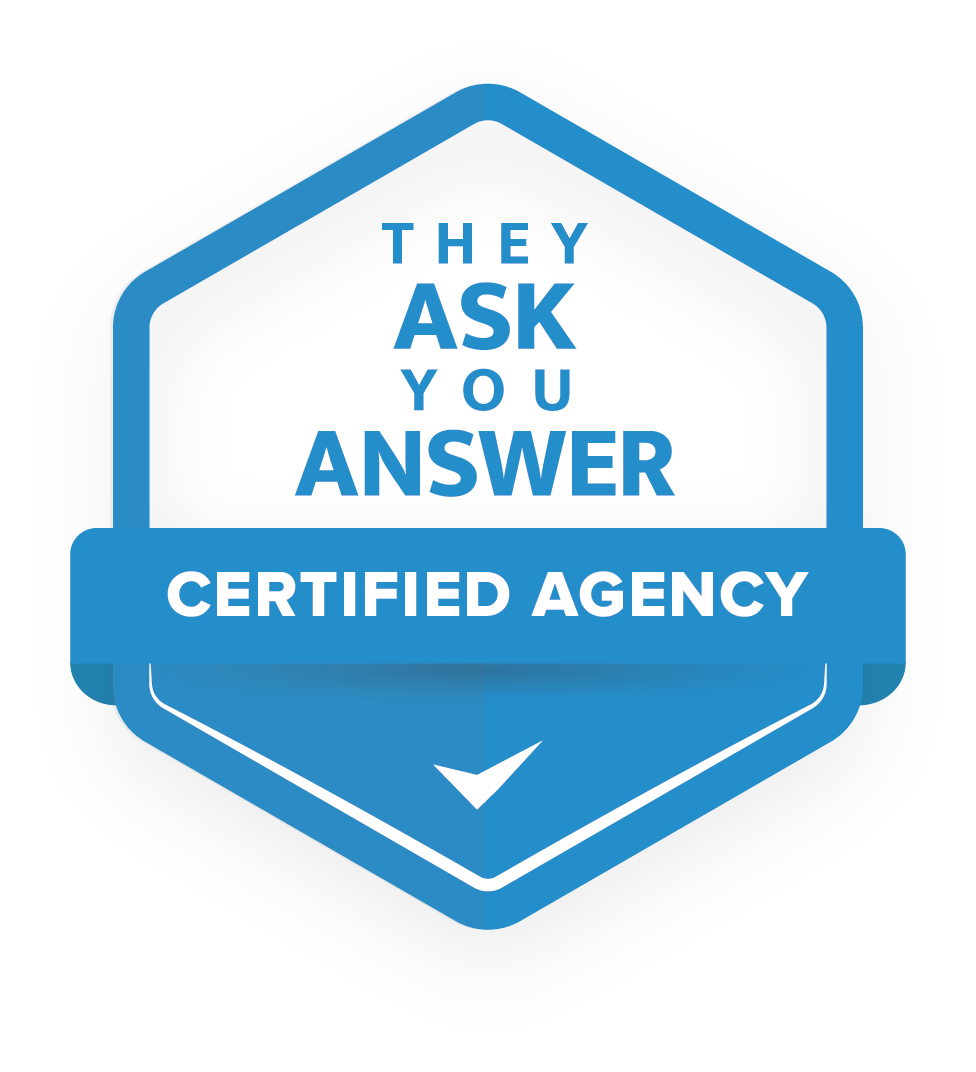Do I really need to write about my competitors in my content?

In a previous life, I worked at a heat pump supplier. I was already familiar with the They Ask, You Answer philosophy, so we published articles on our website giving honest and complete answers to our customers' questions.
We wrote about the cost of a heat pump, its disadvantages, and we compared different solutions. In short, we wrote about the blog topics that generate traffic, leads and sales.
At one point, my boss came up with the idea of writing a competitor review. There was a nice search volume on the search term '[competitor name] review' and the only sites that came up at that time were sites like Trustpilot, Tweakers and Radar's forum.
In addition, one of our colleagues had had a heat pump of that brand installed, so we could also draw on first-hand experience.
It would be an honest review in which we would discuss both the positive points and the areas of improvement of the brand.
But then a new marketing manager was brought on board and famously said: I don't think that's a good idea.
I left the company shortly thereafter (not for this reason, mind you), so I never got to ask him exactly why he didn't think it was a good idea.
But I suspect he was afraid that consumers would buy the competitor's heat pump if we pointed out its existence.
Maybe you too are thinking: why should I write about my competitors' products on my Web site? I don't want to make consumers wiser than they are. I prefer to assume my own strengths and focus on the benefits of my own products.
Understandable.
As a business owner, you naturally want potential buyers to deal with your company and not the competitor. But your customers usually know very well that there are alternatives and will investigate them.
How do you deal with this?
Here at Buzzlytics, we teach companies how to become the "trusted advisor" in their market, by openly, honestly and completely answering all of their potential customers' questions. So the question at the top of this article comes up regularly in conversations with (potential) clients. Reason for us to devote an article to it.
By the end of this article, you'll know why it's smart to pay attention to your competitors in your content. In addition, you have received practical tips on how to do this to build more trust with your target audience and increase your organic reach.
Here we go.
Reasons why you should write about your competitors
Writing about your competitors may feel counterintuitive, but it has several advantages.
1. You build trust with potential buyers
Companies often think their potential buyers are unaware of alternative options. Nothing could be further from the truth.
Think back to the last time you bought something that took you longer than 5 minutes to think about.
You've probably researched different alternatives, read articles or watched videos comparing products, and chances are you've also read reviews.
Your potential customer does too. So it is a fallacy that he does not know about the existence of the competition if you do not point it out to him.
Talking about your competitors in your content shows that you have your customer's best interests at heart. Instead of acting like a salesperson, you are posing as a trusted advisor who wants to help a customer with their buying decision. Regardless of whether that customer ends up buying from you or not.
Of course, this doesn't mean you should "bash" your competitor. Your customers will see right through that. What matters is that you give the facts about your competition. What are their products, services, and weaknesses and strengths? I discuss this in more detail later in this article.
Talking about your competitors in your content shows that you have your customer's best interests at heart.
2. You increase your organic reach
When you write about your competitors, you attract search traffic that would otherwise go to your competitor's site or review websites.
For example, I wrote in the introduction that there was a nice search volume on '[competitor name] review'. That traffic was now going to Trustpilot and forums, but if we had published this review, we could have benefited from this.
Moreover, it is a great way to hitch a ride on your competitor's brand awareness. That way, as a small player, you can attract visitors who may have never heard of you. Maybe your honest, transparent and complete review will make them decide to buy from you.
By writing about your competitors, you attract search traffic that would otherwise go to your competitor or review websites.
3. You control the conversation
Finally, you can steer the conversation around your competitors by naming how other companies could also help your potential client.
Again: this does not mean running your competitors into the ground.
It is essential that you remain honest and unbiased. Potential buyers know very well when you try to sway them away from the competitor.
But you can choose which facts you share and which you don't.
And by creating content about your competitors, you can also more naturally insert yourself into the conversation for a direct comparison.
3 methods for writing about your competitors
OK, writing about your competitor might not be so wrong. But what kind of article should you write? Here are a few suggestions.
Answer questions about your competitor
First, you can answer the questions potential buyers have about your competitors. For this, you can use the Big 5 as a starting point.
Does your competitor not write openly about things like costs, disadvantages and comparisons? Then you can jump into this gap and introduce yourself as an expert and alternative that way.
List the best competitors
Another option is to list the best competitors. After all, people are constantly looking for the best solution to a particular problem.
For example, my previous employer could have conducted a competitive analysis of heat pump suppliers and then published an article on "the best heat pump suppliers.
In articles by American companies, you often see that they also include themselves in such a list. In fact, they put themselves at the top, as ClickUp also does in the example below:
At They Ask, You Answer we don't do this. After all, your readers know you wrote the article, and if you put your own company in it, you come across as biased and lose credibility.
Compare direct competitors with each other
Finally, you can write an article comparing different competitors.
These types of articles are intended for people who have seriously weighed their options and are now struggling to choose between some options.
This does not necessarily require a lot of search volume. Sales can also use the article when a potential buyer asks what the difference is between you and the competitor.
One example is our article on ActiveCampaign vs. HubSpot, which is aimed at (potential) customers who are currently using ActiveCampaign and are wondering if they should switch to HubSpot for our TAYA Mastery course.
Best practices for writing about your competitors
What should you pay attention to when writing about your competitors? What should and shouldn't you do? Below I offer some tips.
Build confidence in your introduction
One of the best ways to build trust with your target audience is to explain early on what makes you an expert.
In other words, tell what makes you credible so that your target audience understands why they should listen to you.
In your content, explain early on what makes you an expert.
Let's look at two examples.
The first example comes from a blog on HubSpot costs by my colleague Lucas.
He explains why he is qualified to write on this topic: he has experience with HubSpot from various roles, and he has discussed costs with companies many times.

I came across the second example when I was looking for reviews of the Reclaim tool.
I noticed that the author names why her review is different from other reviews and why she is an authority on the subject: she has been using Reclaim for almost a year and has also tried other tools long enough to be able to explain the differences between Reclaim and the other tools.
Share the facts about your competitors
And now it's time for the answer to the question you've been looking for since the beginning of this article: if you're going to write about your competitors, what exactly should you tell them?
The answer: the facts.
So you go into:
- Who your competitor is
- How long he has been active
- Won awards or seals of approval
- What he is known for
- Any advantages and disadvantages of his products or services
Are you genuinely enthusiastic about your competitor? Then feel free to show it. But be careful with negative comments. They can erode the trust you are building with your target audience.
And we all know the expression about trust that comes on foot and goes on horseback.
By limiting yourself to the facts, you also reduce the risk that your competitor may not like what you write and threaten legal action. After all, facts are not slander.
Round out with concrete directions
Your conclusion should reiterate the main purpose of your article: to help potential customers make the best buying decision.
If you run into X, go for Y.
If your problem is A, go for B.
The aforementioned article on ActiveCampaign vs. HubSpot, for example, ends with a conclusion headlined "What's the best option for you? In it, we briefly summarize again what is the best option for which company.

Should you or shouldn't you link to your competitors?
One question you may still have on this topic is whether or not you should link to your competitors in your content.
On the one hand, linking has SEO benefits and increases your chances of appearing at the top of search results. Google appreciates it when you link to other pages.
On the other hand, you are making it very easy for your visitors to leave your site and go to the competitor's site. But how much extra effort is it for your visitors to open a new tab and still go to the competitor's website?
So both options have pros and cons. The choice is yours.
Linking to your competitors increases your chances of getting to the top of search results.
Win your customer's trust with objective and unbiased content
Buyers (b2b as well as b2b) today thoroughly research all options online before making a purchase decision.
By sharing the facts about your competitors, you show that you have your potential customer's best interests at heart, and you build trust. With your objective and unbiased content, you can help him make the best choice.
At Buzzlytics, we help companies become the "trusted advisor" in their market, and we can help your company do the same.
Wondering if They Ask, You Answer is the right approach for your business? Read our article They Ask, You Answer Will it work for my business? or schedule a consultation with one of our consultants.
Related articles
March 18, 2024
-
Reading time: +/- 5 min
April 12, 2024
-
Reading time: +/- 11 min










